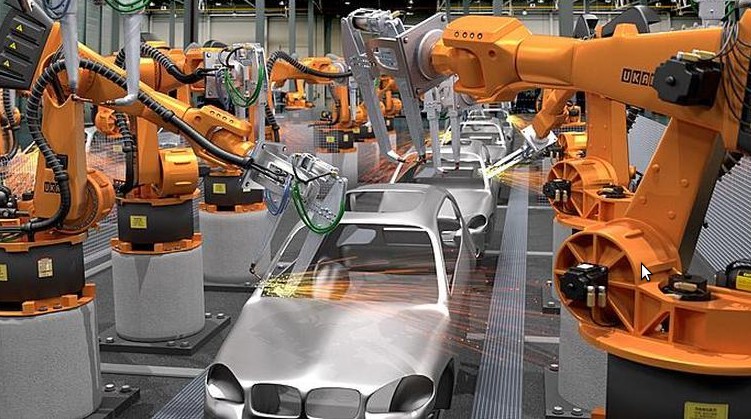Corporate layoffs are coming and why this is a good thing
Our world is changing. Robotics, AI and automation will do more to increase layoffs of workers than anything we have seen in the past 30 years. Think you have a safe job? Think again. You don't. The corporate mindset wants to destroy your job, but if you are on the path towards financial sustainability, this shouldn't be a big deal.
This article crossed my computer screen today and it starts to show signs of the looming employment crisis that will affect the western world in the next few years.
Job layoffs surge 35% to highest level to start a year in a decade
Let's look at how this works, and possible future outcomes. Being prepared is the key to success here.
Corporate business leader movitation
In the 1970s, the Nobel prize winning economist Milton Friedman stated that it was all about maximizing shareholder's value. This ideal became the turning point because it seems that "succeed at any cost" somehow was coupled with his thesis and as a result, the worker's rights began the downward spiral with the eventual disintegration of the trade union. A great article that talks about this transition is here: Maximizing shareholder value: The goal that changed corporate America
So if you were are shareholder in corporation X, you did really well. This is further evidenced by the fact that since the 1980s, the Dow Jones Industrial average has risen 25x it's value, whereas average US worker salaries only rose 1.6x. Owning shares in something is way more profitable than working, it would seem. This is clearly our methodology also and let's face it, Numbers don't lie.

So how do you maximize shareholder value? Best way is to increase profits. Profits are simply the difference between revenue, less costs & expenses. If you look over the Income statement of any enterprise, you will often see that the largest line item in the expenses is the cost of labor. People who devote their entire life to something, expect to be paid. Wages & associated on-costs for employees can be huge, and people are unpredictable. If Wall Street responds favorably to predictable and growing profits, then you want to curb any risks to that as much as possible and reduce expenses down to the bare minimum.
This is the motivation of corporate leadership. They don't care about the community as much as they might pretend to. Sure, new organizations come along with such grandiose goals to curb climate change, support the local community, have happy customers and happy employees, etc. All great "feel good" statements. When it comes to actual numbers, you know in the boardrooms, they don't care about any of that. "Business is business" is the mantra, which is just dangerous. But in a world hooked in DJIA numbers, watching CNBC all day, and immediate gratification, this is reality. You can't change it as much as you want, and you should know that any marketing of feel good ideologies is just fluff. When the execs get into the boardroom, it is a kill or be killed attitude.
Stage 1 - Globalize labor
Some places in the world are really cheap to live. Some have governments that provide free education, even to the tertiary level. Worker's rights are minimal and the choice of starvation vs. working for a pittance is something that many in third world countries will choose. Consequently over the past 30 years we've seen the advancement of globalized labor affecting jobs in western economies.
Walk into any Walmart or large corporate retail chain and chances are that 91% of all products on the store shelves for sale were Made in China. The rest of the products were probably made in another lower cost region in the world. By creating supply chains based on shipping and using the Internet and low cost communications, companies can provide manufacturing at pennies on the dollar costs that local manufacturing would cost, and this has displaced workers in industries that traditionally were large labor hiring facilities. The auto industry in the USA is the prime example of this, with massive layoffs and factory closures in the mid-west of the USA.
So US corporations have moved their manufacturing of physical goods to China. Fact. It is rare to find anything made in the USA now, and it is subjective to think that the manufacturing quality of Chinese manufacturing is inferior to local manufacturing. When you make the quantity of products the Chinese do, they get really good at it. When you reduce local manufacturing, you lose the edge. This is just normal.
But we have seen shifts in labor that targeted middle class workers in the USA. This starts on repetitive tasks that US workers choose not to do. But in countries where education is provided for almost free, they create a highly skilled workforce that starts to threaten the US workers. Computer programming is the largest and most obvious example of this. The amount of IT work sent off-shore to India, for example, displaced most major corporations IT staff. And we are talking big corporations. Here's just a few examples: Disney Capital One & Wells Fargo, New York Life, etc.
As cheaper global offshore organizations bring in workers to the USA under immigration programs such as the H1B program, they return back to their home country with the knowledge & experience of what the customer (the US corporation) needs, and they train to meet that need at pennies on the dollar costs of what the local workers charge. I've even seen examples of friends who I worked with in corporations 20 years ago, now employed by the very same Indian IT outsourcing firms that took their jobs, in order for them to meet local worker quotas that might have been placed on those outsourcing companies by government regulation. Meanwhile the very same government agencies are vetoing such legislation.
The transition results in moving critical intellectual property offshore, and one industry begets another. CPAs and book keeping services are routinely offshored, along with graphic design, CAD/CAM work, QA testing, etc. as the move to embrace cheaper global labor ramps up more each day.
Stage 2 - Remove labor altogether by automation
There are tasks better done by machine. If you are doing fine work, a laser guided machine will do it flawlessly rather than relying on a human who may create an unpredictable result, and with error. The machine can work 24 hours a day, 7 days a week. The human demands time off. The machine doesn't need health insurance, commission, motivation, management, etc. And the humans are the largest expense line item, so it is pretty obvious that if a corporation has succeeded in reducing labor down with offshoring the work, bringing it back under their control but having robots do it, is the next logical step.

It seems that the Chinese are seeing this coming, with this latest push: Made in China 2025 Those with the better robots, win, it would seem.
As long as the supply of raw materials can be met, all items can be built by a robot. Consider 3D printing and how anyone with a design of something and some raw material can have it made with a robot. This is the future, and a human only needs to invent the idea of what is required and the robot army will make it. The same approach will apply to digital goods production (even software) in the future, where the ability to create digital products will be done automatically and distributed automatically. Distribution using robots and eCommerce kiosk style vending is why Amazon is now the world leader in commerce and soon to take over as the largest retailer in the world. Our demand for low price and fast delivery trumps quality and loyalty to a local job market.
The definition of insanity
Albert Einstein famously stated "The definition of insanity is doing the same thing over and over and expecting different results.".
Labor is going away. Sure, it will have upticks along the way because as technological innovation creates new industries, they need to be staffed with people. But consider the rate of advancement in automation. We use a commonly held belief in "Moore's Law", in that each successive 18 months, technology will be twice as fast, for half the cost. This is not necessarily scientific fact. Sure, during times of high invention we've seen this. But I would suggest the past 50 years is an outlier in human history and not something to predict the next 50 years on. Here's some evidence to support this.
Yet, when we deployed the Internet as a new thing in the 1990s, we created enormous wealth and new jobs, etc. My question is will the advent of autonomous vehicles create the same uptick in employment? We already have vehicle support infrastructures in place (e.g. fuel, mechanics, tires, etc.) and those won't change. We are not introducing more vehicles onto the road. We are just taking away the need for a human to control them. Will creating hamburgers made by robots create more jobs? No. We already have the raw materials in place and the eating public can only eat so much. Maybe the cost of food might decrease but if that simply leads to more over-eating, the human population will decrease even though medical technology might increase. Net 0 gain there.
What about supply chain opportunities? Will having more stuff create more supply chain jobs? Nope. The trucks will be automated. The warehouses are run by robots. The transactions are all done via web services and secured banking transfers, the packaging is done by robots. There isn't any new opportunities here.
Surely software development to write the programs that controls these robots will be a huge industry? Nope. The software already exists and is likely to be far simpler in the future. Plus with the advent of the globalization of offshore work, it is not cost effective to hire a $120K per year salaried software developer when an offshore worker will do it for $20K. In order to learn software development, you need software projects and they are reducing in numbers - not increasing.
Anyone who has a job now, is simply filling a temporary position until the corporation decide a way to automate it and lay off the workers. It is that simple. Don't fall victim to denial here because your job is going away.
Here's a great example of this: Shark Tank inventor denied investment due to unwillingness to outsource labor Nuff said.
Yes, the corporations want you to lose your job. You should too.
Investing all of those corporate profts back into robots & automation makes sense. It is the exact same mantra that we preach in financial sustainability here. Buy assets that produce dividends and stop working for a living. Seems that we are in good company. Meanwhile the mindless worker trudge aimlessly to the next job interview, like a Zombie horde on The Walking Dead episodes.
The insanity has to stop. Relying on an economy based on labor employment is futile. But the challenges to break free from this may seem daunting to most. I mean we were raised on the mantra to get a good education, get a good job, raise a family, retire, etc. That worked in 1960. It doesn't work in 2019. Education is expensive and good jobs are rare and threatened by automation & globalization. To spend hundreds of thousands in education costs that have to be paid back a decade or so later, and yet banking on a job market which is clearly at odds with corporate ideology, is foolish. But this is what 90% of Americans do and believe. That somehow a magical fairy will emerge from behind a tree, wave their magic wand and everything will be fine. Nope. Give it up. Ain't gonna happen.
But remember this... The richest people in the world got rich because of the wealth distribution moving into their arms. Although our currency might be based on magic numbers that are made up by a Federal Reserve, true wealth doesn't just disappear. It moves from one person to another. Anyone who is ready & willing to receive it with open arms will receive it. The question is whether you are ready to receive it.
Wealth will never come to you in the form of a job. Sure, there are CEO's that make massive salaries. But they don't get rich from the salaries. It is the stock options that make them rich. True wealth comes from passive income generated by owning assets. Let me repeat that again: True wealth comes from passive income generated by owning assets.
If you have a low burn rate, and you own assets, you'll do just fine. In fact, in a changing world like this, you would do more than just fine. Welcome to the 1%, financial sustainability followers.
The problem might be more about what you do to protect yourself from the rampaging hordes of workers that are made redundant. Picture the ghost towns of Michigan & Ohio as a result of the factory closures there. Is that the neighborhood you want to live in? Maybe not. Maybe a gated community with armed guards is more to your fancy. Because in times when wealth distribution is not even, you will be fighting to keep what you have generated. You will be fighting to keep it from common criminals, scam artists, etc. but more importantly you will be fighting to keep it from governments that have to redistribute the wealth. Sure, that is not the American way. But the American way that was built on Chevrolet and Coca-Cola is long gone. The vague echoes of those bygone eras might make for interesting tourist stops along Route 66 but they are not day in the life things now. We are alreadyu seeing the looming threat of taxing the robots, to try and redistribute wealth, but I don't see that happening. Our current government structure relies solely on corporate financing and those corporations will never support financially anything that is not in their own self interest. So the middle class will get stuck with the bill yet again.
Don't be a victim. There are things you can do today that will help you move forward and mitigate risks:
- Buy income producing assets. Real Estate, automated kiosks & vending machines, interest in businesses you don't operate, dividend paying stocks, etc.
- Generate at least your burn rate in passive income so you can withstand a loss of a job. This takes time, but you gotta start today if you haven't already.
- Get a 2nd (or 3rd) passport. The wealth distribution is coming, the economy will falter from it, and you need an escape plan if the SHTF
- Internationalize your assets if possible. Owning real estate (ideally income producing real estate) in other countries that are less likely to be impacted by the labor shifts of the USA should be part of your safety plan.
- Buy precious metals, particularly gold.
- Buy alternative currencies that cannot be deflated by Federal Reserve actions. Bitcoin, Ethereum, etc.
We know that we have a future obligation to social security & Medicare for our seniors and with baby boomers representing such a large voting population, politicians are not likely to leave them holding the bag. But in order to fund the existing future obligations, either they will need to double tax everyone, or they will devalue the $USD so that obligations literally half. Having said that, it means anything you have in $USD will half in value at the same time. Twice as much $USD will be needed to buy the same thing. Holding alternative currency implements is wise - particularly those that cannot be devalued by third party agency intervention. Gold & BTC is the most logical choice. If you don't understand these assets, it is now time to start to learn. Also if you are considering gold, know that physical gold is the only way to go here. Don't buy gold futures or paper based assets because they can be manipulated. Physical gold is good. BTC is fine but hold it in your own hardware wallets. Again, anything subject to external manipulation or theft is not good. In times of resource depletion, people do crazy things and nothing is safe. You might want to consider putting a portion of your IRAs or 401K into physical gold as a safety net as well. This might be helpful (I am not sponsored by this company - just one that I found that seem to understand the value of safe haven assets): ITM Trading & IRA investments
Meanwhile the one thing robots don't have that only we humans do is imagination. I predict we may see a renaissance period for art due to high availability of human time that can be best placed in creative endeavors. Maybe you might want to be a part of that. Maybe you could actually do all those things you've always wanted to do with your time, but never had the time to apply to them. This is now, people. This is the time that you can be truly unconstrained, but only those that are prepared and ready will receive the wealth that comes with movements like we will see in the near future.




